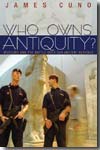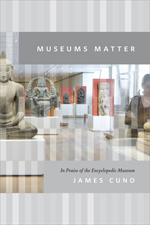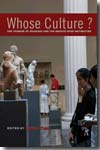Who owns antiquity?
museums and the battle over our ancient heritage
- ISBN: 9780691137124
- Editorial: Princeton University Press
- Fecha de la edición: 2008
- Lugar de la edición: New Jersey. Estados Unidos de Norteamérica
- Encuadernación: Cartoné
- Medidas: 24 cm
- Nº Pág.: 206
- Idiomas: Inglés

Servicio de búsqueda de libros
Este libro está agotado o descatalogado por la editorial. Si lo desea podemos buscar esta obra en librerías de saldo y ocasión.
Sí, por favor búsquenme este libroWhether antiquities should be returned to the countries where they were found is one of the most urgent and controversial issues in the art world today, and it has pitted museums, private collectors, and dealers against source countries, archaeologists, and academics. Maintaining that the acquisition of undocumented antiquities by museums encourages the looting of archaeological sites, countries such as Italy, Greece, Egypt, Turkey, and China have claimed ancient artefacts as state property, called for their return from museums around the world, and passed laws against their future export. But in "Who Owns Antiquity?", one of the world's leading museum directors vigorously challenges this nationalistic position, arguing that it is damaging and often disingenuous. 'Antiquities', James Cuno argues, 'are the cultural property of all humankind', 'evidence of the world's ancient past and not that of a particular modern nation. They comprise antiquity, and antiquity knows no borders'.Cuno argues that nationalistic retention and reclamation policies impede common access to this common heritage and encourage a dubious and dangerous politicization of antiquities - and of culture itself. Antiquities need to be protected from looting but also from nationalistic identity politics. To do this, Cuno calls for measures to broaden rather than restrict international access to antiquities. He advocates restoration of the system under which source countries would share newly discovered artefacts in exchange for archaeological help, and he argues that museums should again be allowed reasonable ways to acquire undocumented antiquities. The first extended defense of the side of museums in the struggle over antiquities, "Who Owns Antiquity?" is sure to be as important as it is controversial.








